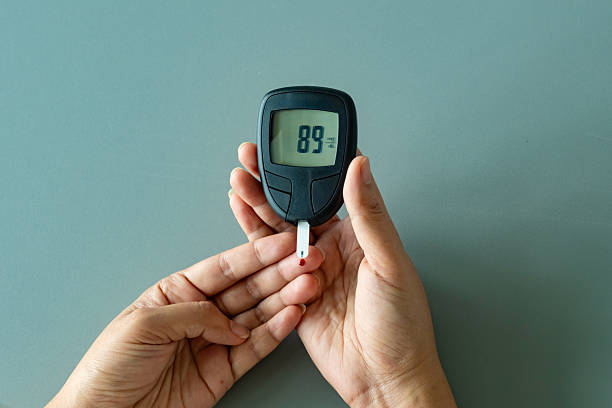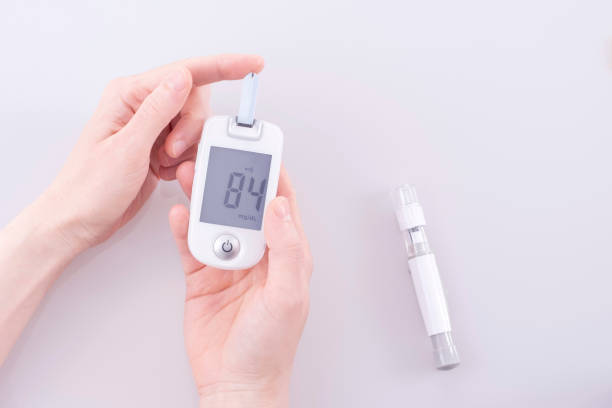Why Blood Sugar Matters for Your Health
Blood sugar, also called blood glucose, is the main source of energy for your body. It comes from the food you eat, especially carbs, which are broken down into glucose during digestion. Once in your bloodstream, glucose travels to your cells where it’s used for fuel. Insulin, a hormone made by your pancreas, plays a key role by helping glucose enter your cells.
When your blood sugar is balanced, you feel energized, focused, and healthy because your body has the steady fuel it needs. But when it’s too high or too low, it can throw your body out of balance. Uncontrolled blood glucose can affect almost every system, from your brain and heart to your kidneys and vision.
Understanding how it works and how it impacts your overall health is key to preventing problems like diabetes, heart disease, nerve damage, and fatigue. By learning how to keep your levels steady, you can protect your long-term health and improve your daily quality of life.
What Is Blood Sugar?
Blood sugar is the amount of glucose in your bloodstream. Glucose is the fuel your body runs on, and without it, you cannot function at your best. Your body needs glucose for:
- Fueling your brain and muscles – The brain relies on a steady supply of glucose to think clearly, while your muscles use it for strength and movement.
- Supporting physical activity – From walking to exercising, glucose gives your body the energy it needs to stay active.
- Helping organs function properly – Vital organs like your heart, liver, and kidneys need glucose to keep working smoothly.
Insulin, a hormone made by the pancreas, helps move glucose from your blood into your cells where it can be used for energy. When this process works well, your blood glucose stays in a healthy range. But when insulin does not function properly, or when your body resists its effects, blood sugar levels can rise too high or drop too low. Over time, these imbalances can increase the risk of diabetes, weight gain, fatigue, and other health issues.
The Effects of High Blood Sugar
When itr stays too high (a condition known as hyperglycemia), it can harm your body over time. High blood sugar often develops slowly, and many people may not notice the signs at first. But even mild elevations, if left untreated, can create stress on vital organs and systems.
Short-Term Effects of High Blood Sugar
These symptoms may appear within hours or days:
- Frequent urination – Your kidneys work harder to remove extra sugar from the blood.
- Increased thirst – Excess fluid loss makes you feel thirsty all the time.
- Headaches – Dehydration and blood sugar shifts can trigger headaches.
- Fatigue – Cells do not get enough energy when glucose cannot move into them properly.
- Blurred vision – High glucose can cause swelling in the lenses of your eyes.
Long-Term Effects of High Blood Sugar
If high blood sugar continues unchecked, it can lead to serious complications:
- Type 2 diabetes – Chronic hyperglycemia is the main driver of diabetes.
- Heart disease and stroke – Damage to blood vessels raises the risk of cardiovascular problems.
- Kidney damage – Overworked kidneys can lose their ability to filter waste.
- Nerve damage (neuropathy) – High glucose can harm nerves, causing pain, tingling, or numbness.
- Vision problems such as diabetic retinopathy – Tiny blood vessels in the eyes can break down, leading to vision loss.
According to the Centers for Disease Control and Prevention (CDC), diabetes can increase the risk of serious health complications if not managed properly. The longer it stays uncontrolled, the greater the chances of lasting damage. That’s why early awareness, regular monitoring, and lifestyle changes are so important for protecting your long-term health.

The Effects of Low Blood Sugar
Low blood sugar, also known as hypoglycemia, happens when your glucose levels drop below normal. This can occur when there is too much insulin in the body, not enough food, or after intense exercise. It is more common in people with diabetes who take insulin, but it can affect others as well—especially if meals are skipped or alcohol is consumed on an empty stomach.
Symptoms of Low Blood Sugar
The warning signs often come on quickly and may include:
- Dizziness – Feeling lightheaded or unsteady.
- Sweating – The body reacts by releasing stress hormones.
- Rapid heartbeat – The heart pumps faster as glucose levels fall.
- Confusion or irritability – The brain struggles when it does not get enough glucose.
- Shakiness – Muscles may tremble as your body signals low fuel.
If left untreated, severe low blood sugar can lead to fainting, seizures, or even coma. In extreme cases, it can become life-threatening. That’s why it’s important to recognize symptoms early and treat them quickly with fast-acting carbohydrates, such as fruit juice, glucose tablets, or a small snack. Regular monitoring and planning balanced meals can also help prevent sudden drops.
How Blood Sugar Affects Daily Life
Even small swings in blood sugar can change how you feel day to day.
- Energy levels: Balanced blood sugar keeps you energized, while spikes and crashes can leave you tired.
- Mood and focus: Low or high levels can cause irritability, anxiety, or trouble concentrating.
- Weight management: High blood sugar often leads to cravings, overeating, and weight gain.
- Sleep quality: Blood sugar swings can interrupt deep, restful sleep.

Blood Sugar and Long-Term Health
Keeping your blood glucose balanced doesn’t just help you feel better—it can prevent serious diseases.
Diabetes and Prediabetes
Chronic high blood sugar is the main cause of type 2 diabetes. The American Diabetes Association reports that millions of people have prediabetes and don’t know it. Prediabetes means it is higher than normal but not yet in the diabetes range. Without changes, many will develop type 2 diabetes within a few years.
Heart Health
High blood sugar can damage blood vessels, making heart disease more likely. People with diabetes are twice as likely to have heart problems as those without.
Brain Health
Studies show that poorly controlled blood sugar may raise the risk of dementia and memory problems. Balanced blood glucose supports better focus, memory, and brain health over time.
Eye Health
Too much glucose in the blood can damage the tiny blood vessels in your eyes, leading to vision issues or even blindness if untreated.
What Causes Blood Sugar Imbalances?
Several factors can cause blood glucose to rise or fall. These shifts can happen daily and may affect how you feel, even if you don’t notice them right away:
- Eating too many processed carbs and sugars – Foods like white bread, soda, and sweets can spike quickly, then cause a crash.
- Skipping meals – Going too long without eating can make blood sugar drop, leaving you tired, shaky, or irritable.
- Lack of exercise – Physical activity helps your body use glucose for energy. Without it, sugar can build up in your blood.
- Stress – When you’re stressed, your body releases hormones that raise blood sugar levels.
- Certain medications – Some drugs, like steroids, can cause blood glucose to increase.
- Hormonal changes – Shifts during puberty, pregnancy, or menopause can affect insulin sensitivity and glucose control.
- Poor sleep habits – Not getting enough rest can upset hormones that regulate blood sugar, leading to higher levels.
Understanding your triggers is the first step toward better control. Once you know what causes your blood sugar to change, you can make simple adjustments—like planning balanced meals, adding daily movement, or creating a sleep routine—that help keep your levels steady.
How to Maintain Healthy Blood Sugar Levels
The good news? Small lifestyle changes can make a big difference.
Eat a Balanced Diet
- Focus on whole foods like vegetables, lean proteins, and healthy fats.
- Choose complex carbs such as whole grains, beans, and fruits instead of refined sugars.
- Add fiber-rich foods to slow down glucose absorption.
Stay Active
Exercise helps your body use glucose for energy. Aim for at least 30 minutes of moderate activity most days of the week. Walking after meals is especially effective.
Manage Stress
High stress can raise blood sugar. Try stress-busting habits like meditation, deep breathing, or yoga.
Get Quality Sleep
Poor sleep affects hormones that regulate blood sugar. Aim for 7–9 hours of quality rest each night.
Stay Hydrated
Water helps your kidneys flush out excess glucose through urine.
Monitor Your Levels
If you’re at risk, check your blood sugar regularly. Home glucose monitors and continuous glucose monitors (CGMs) make this easier than ever.

Foods That Help Control Blood Sugar
Adding certain foods to your diet can support better balance:
- Leafy greens – Spinach, kale, and Swiss chard
- Berries – Blueberries, strawberries, raspberries
- Nuts and seeds – Almonds, walnuts, chia seeds
- Beans and lentils – High in fiber and protein
- Whole grains – Oats, quinoa, brown rice
- Fatty fish – Salmon, sardines, mackerel
These foods help prevent sugar spikes and keep you fuller longer.
When to See a Doctor
If you experience frequent blood sugar highs or lows, talk to your doctor. Regular check-ups, blood tests like the A1C test, and professional advice can help you catch problems early.
Final Thoughts: Take Charge of Your Blood Sugar
Your blood sugar affects nearly every part of your health—from energy and mood to heart and brain function. The choices you make today can protect you from serious health problems tomorrow.
By eating well, staying active, and paying attention to your body, you can keep your blood sugar in check and enjoy a healthier, more energized life.
👉 Take action today! Start by making one small change—like swapping sugary drinks for water or adding a daily walk. Your future self will thank you.
What’s your favorite tip for keeping blood sugar balanced? Share it in the comments—I’d love to hear from you!



